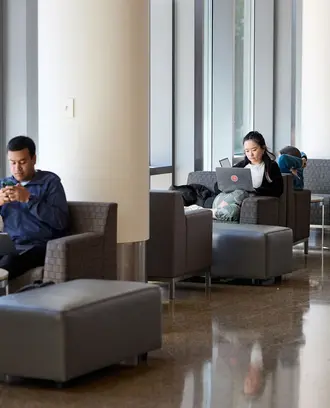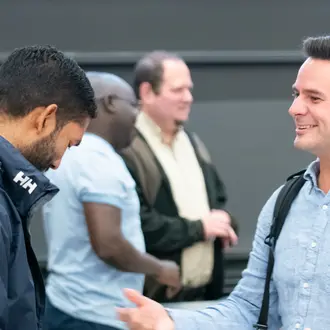For nearly two decades, Google has been working on technology that helps people collaborate across continents. “We want to connect people all over the world so that they can to do great things together,” says , SF ’06, vice president of engineering and product at the global dynamo. Google was already in gear when the pandemic hit. The company had been highly invested in perfecting Google Meet, a Zoom-like platform that has evolved out of its original concept Google Hangouts, and it is continually providing new features to meet amped-up demand.But what about inside Google itself? How has the landscape changed for Google’s employees? Frey notes that crises can be spurs to innovation, and one manifestation of that crisis thinking is the motivation to collaborate with others who can help you to solve your challenge. “This pandemic is bigger than all of us,” she says. “We’re exploring many creative pathways that can get us and others through this trying time. We have a new partnership with Apple, for example, to develop contact-tracing software. In California, we’ve entered into a partnership with Governor Gavin Newsom and T-Mobile to get wi-fi hotspots and Chromebooks to people in under-served communities who need to work from home.”
Introducing a hybrid format
In terms of the employer/employee contract, Frey says that Google is transitioning from what was predominantly an in-person workplace to a hybrid environment. “It’s so important to be flexible for all sorts of reasons—kids, exercise, commitments outside of work,” she notes. “Yes, there will be times when we all want to come together to solve a problem—no one wants to abandon the office full stop—but Google employees will be working from home more routinely, coming together when that will benefit the process.”
In terms of evaluating employee performance, Frey notes that Google has never judged employees by the amount of time they spend in the office. “We are a performance and impact company. Working from home has not changed that. Launching new products, taking care of customers, changing the world in positive ways—that’s how our employees are judged.”
Frey also underlines that a key element of Google’s contract with its employees—written and unwritten—is mental health, and the pandemic has broadened and deepened company efforts in that realm. The quarantine, she says, has relieved stress in some areas and increased it in others. “In the plus column, now that we’re at home, we realize just how much time we spent commuting—often, at least two hours a day for me,” says Frey. “It takes a toll on employees and their families. Having that time back to be productive—at home and at work—is a great boon.”
Frey is concerned about employees who feel isolated or who have health concerns for themselves or family members, and she checks in often with team members to see if they need support. “We also realize that this virus affects certain people disproportionately, and that is something we are working to address.”
Committing to equity
That understanding has only accelerated Google’s existing commitment to diversity, racial justice, and equity—efforts that Frey reports have not been impeded by the shift to a remote environment. “Our leadership teams are deeply invested in supporting Black-owned businesses and racial justice. We’ve held many listening sessions with our employees so that we can learn about these issues directly from those who feel the impact. We’ve invited internationally-recognized experts in civil rights and civil liberties to instruct us in subjects like structural racism, ethnicity, and othering. And we have started book groups to discuss key works on these subjects. I make it a point to bring up the subject at meetings frequently so that it is never absent from the table. Bottom line: we are always learning and helping our workforce to learn. If you work at Google, you’re here to serve the world, and equality for all is a core aspect of that mindset.”



